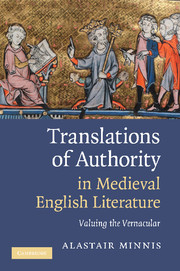Book contents
- Frontmatter
- Contents
- Preface
- List of abbreviations
- Introduction: valuing the vernacular
- Chapter 1 Absent glosses: the trouble with Middle English hermeneutics
- Chapter 2 Looking for a sign: the quest for Nominalism in Ricardian poetry
- Chapter 3 Piers's protean pardon: Langland on the letter and spirit of indulgences
- Chapter 4 Making bodies: confection and conception in Walter Brut's vernacular theology
- Chapter 5 Spiritualizing marriage: Margery Kempe's allegories of female authority
- Chapter 6 Chaucer and the relics of vernacular religion
- Notes
- Bibliography
- Index
Preface
Published online by Cambridge University Press: 30 June 2009
- Frontmatter
- Contents
- Preface
- List of abbreviations
- Introduction: valuing the vernacular
- Chapter 1 Absent glosses: the trouble with Middle English hermeneutics
- Chapter 2 Looking for a sign: the quest for Nominalism in Ricardian poetry
- Chapter 3 Piers's protean pardon: Langland on the letter and spirit of indulgences
- Chapter 4 Making bodies: confection and conception in Walter Brut's vernacular theology
- Chapter 5 Spiritualizing marriage: Margery Kempe's allegories of female authority
- Chapter 6 Chaucer and the relics of vernacular religion
- Notes
- Bibliography
- Index
Summary
I thought of three things in writing an extensive introduction and a series of notes. It was a literary joke – hence I referred twice in Slave Song to T. S. Eliot, because Eliot had also joked and provided a kind of spoof gloss to The Waste Land. On another level, we had been arguing for a long time that Creole was a distinctive language. We made a lot of politics out of that. It was part of the nationalism in the 60s. We had our own airline, environment, landscape, and fruits, so we should have our own language. If we were going to take that seriously we should provide translations to our poems. But the third reason is the most serious … I wanted to question the relationship between the work of art and the critical industry that arises because of that work of art.
Here the Guyanan British poet David Dabydeen is explaining why, in Slave Song (1984), he provided his Creole poems with translations and a commentary (comprising an introduction and notes) in Standard English. His intentions would have been utterly comprehensible to those fourteenth-century Italian writers who sought to establish an illustrious vernacular in face of the hegemony of Latin, which in their day enjoyed the prestigious position occupied by Standard English in Dabydeen's Britain. I am thinking not only of Dante (who managed to praise the vernacular in Latin and Latin in the vernacular) but also of Francesco da Barberino (1264–1348), lawyer and lover of Provençal poetry.
- Type
- Chapter
- Information
- Translations of Authority in Medieval English LiteratureValuing the Vernacular, pp. ix - xiiPublisher: Cambridge University PressPrint publication year: 2009



